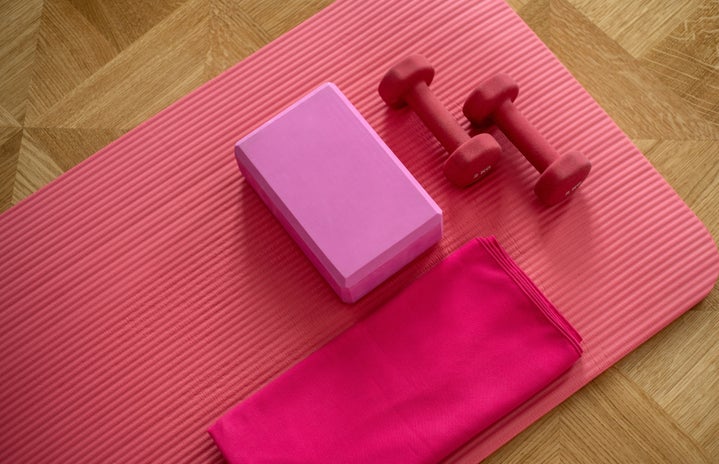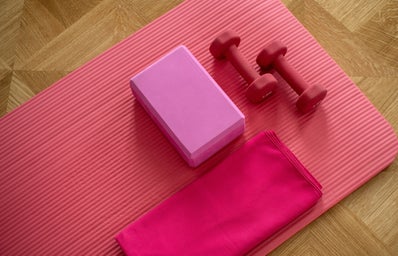This article is not meant to be taken as medical advice – please consult with a registered dietician or a medical doctor before introducing any supplements or changes in diet or exercise.
Gut health, the 12-3-30 workout, Pilates, weightlifting, high protein diets… If any of these sound familiar to you, then you are probably aware of the increasingly popular health and wellness trends that have been taking over TikTok recently.
TikTok has quickly become an integral part of the social media lives of many teenagers and young adults. The video sharing app is known for its “For You” page, which aims to show users carefully selected videos to match their interests. However, many of us are familiar with the many viral “health and wellness” trends, which appear to be shown to users regardless of their interests.
While many of these trends claim to be “anti-diet culture”, this may just be a way of getting around the fact that many people in recent years have come to reject fad diets, such as banting or low-fat. It is now much more acceptable to describe a change in eating or exercise habits as a “wellness” change, rather than a “diet”, even if the intentions are the same. We are well aware of the culture associated with the models of the 90s and have become sensitised to the word “diet”, without realising that diet culture has just found a way around this, and continues to target us in new, perhaps more subtle ways.
Arguably the biggest target market for these trends is women and girls. In 2022, TikTok was the fastest growing social media app in South Africa. According to the South African Social Media Landscape Report, 55.8% of TikTok users in South Africa were women, and 71% of South African users were between 15 and 34 years old. This group is highly vulnerable to societal expectations regarding food and body image. It is widely known that young women, particularly adolescents, are more at risk for eating disorders. This was only exacerbated by the Covid-19 pandemic when people spent more time at home and social media use increased.
Therefore, it is more important than ever to critically evaluate these “wellness” trends – are they as beneficial as they claim? Is there any science behind the trend?
Gut health has become one of the most popular topics of discussion in the TikTok health and wellness space recently. The gut microbiome has become a topic of increasing scientific interest in recent years, with research indicating that it may be implicated in many different aspects of health, from digestion and weight management to the risk of disease and the health of your immune system. It is widely accepted that an individual’s diet influences their gut microbiome, but TikTok trends take this to a new extreme. The “gut health” hashtag on TikTok has over 4.2 billion views, and videos under this hashtag make various claims regarding supplements, as well as foods to eat and to avoid.
There is a lot of noise surrounding this topic, but there are a few essential facts that are backed by science. A study from the British Medical Journal states that fibre is commonly overlooked as a nutrient that is important for improving gut health. Probiotics have also been found to be beneficial to gut health by many researchers, as supplementation with probiotics has been shown to improve beneficial gut bacteria, resulting in positive outcomes for weight management and diseases. However, these supplements are often unregulated and may not be clinically effective. Therefore, it may be beneficial to include fermented foods in your diet, such as yoghurt, tempeh and kimchi, as well as natural prebiotic foods, such as onions, bananas, whole grains and legumes, as this is another way to increase growth of beneficial gut bacteria without using supplements.
The “12-3-30” workout hashtag has over 300 million views on TikTok. This trend suggests that walking on the treadmill at an incline of 12 and a speed of 3 miles an hour for 30 minutes will improve cardiovascular health, tone muscles and lead to weight loss. But there is nothing special about this workout – the benefits listed are associated with any form of aerobic exercise, be it running, swimming, or walking. While these benefits may occur at different rates depending on the intensity of the exercise, the idea that a specific workout is required to achieve these benefits is not strictly correct. In fact, an article by the Washington Post suggests that, due to its intensity, the 12-3-30 workout may not be beneficial to everyone, particularly those who are new to exercising. For this reason, it would be best to choose the form of cardiovascular exercise most suited to you.
However, 12-3-30 is not TikTok’s only exercise obsession – Pilates and weightlifting are also popular. Those interested in both will be relieved to know that there is no clear evidence to support the idea that one is conclusively better than the other. Whether you choose to do Pilates, weightlifting, or both depends more on your personal goals and lifestyle. While many of the popular claims surrounding weightlifting are true – there is a large body of scientific evidence to support the fact that weightlifting can increase lean muscle mass and bone density and decrease body fat – this form of exercise may not be suited to everyone.
For those with injuries or conditions that would prevent them from weightlifting, or even for those who simply do not want to lift weights, Pilates may offer a lower intensity alternative. Although there isn’t a lot of scientific research on Pilates out there, this is not to say that it isn’t beneficial. Pilates can still be classified as a form of strength training, and involves the activation of many different muscle groups, particularly muscles in the core. This means that Pilates can still be used to tone and strengthen muscles, even though it may be less strenuous than weightlifting.
Ultimately, it is best to choose a form of exercise you enjoy – this will help you to move your body consistently, which will be more beneficial to both your physical and mental health than forcing yourself to follow an exercise programme that you do not enjoy or that does not suit your body.
High protein diets have taken the health and wellness space by storm. These diets promise to help build muscle mass, while still aiding in weight loss. These claims are not entirely false – it is well known that consuming more protein provides the building blocks for your body to increase muscle mass, and the increased satiety levels following a meal high in protein may assist in decreasing hunger levels throughout the day and therefore help with weight loss. However, there is a key caveat that must be remembered: individual protein needs vary, depending on body composition and exercise levels. It would be best to consult with a dietitian if you are unsure on how much protein you require, rather than following guidelines from social media, which may be unnecessary for you.
Additionally, TikTok videos under this trend often promote supplementation with protein powders as a way to meet this dietary goal. However, as with many other supplements, the safety and effectiveness of protein powders are unregulated, and the transparency of ingredients is not guaranteed. For this reason, it is always better to aim to meet individual protein goals through whole foods. If you do feel the need to use a protein powder, ensure that the brand you are using is fully transparent about their ingredients and the safety associated with them.
In general, blindly trusting health and wellness claims made on social media is dangerous. While many of these trends have their roots in popular science, they have been misconstrued along the way. It would be best to do your own research and read the papers that these health ideas come from, but this is likely to be inaccessible and unrealistic for most people. While scientists do their best to communicate science in a clear and understandable way, scientific papers are still often time consuming to read and difficult to interpret, even if you have a background in science. For many people, the best source of information on individual diet and exercise changes would be a registered dietitian or a medical doctor.


